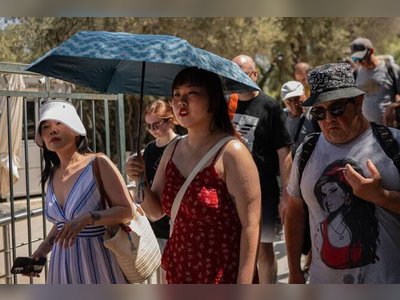
Detainees in Iran Describe 'Unbearable' Conditions After Israeli Strikes on Prison
Inmates Transferred from Evin Report Overcrowding, Lack of Basic Amenities and Intimidation Tactics.
One month after the deadly Israeli air strikes on the notorious Iranian prison, Evin, located in Tehran, detainees claim to be experiencing unbearable conditions at their new locations.
These inmates were moved to various prisons following the attack which killed 80 people, including five prisoners, 41 prison staff and 13 military conscripts according to the Iranian authorities.
The Israeli military targeted Evin on June 23rd citing its use for intelligence operations against Israel as the reason behind their strikes.
Iran has called the attack a 'war crime'.
Amnesty International investigated the incident deeming it a violation of international humanitarian law, and thus a war crime.
They claim there is no evidence that Evin was a legitimate military target.
The Israeli military stated that they conducted the operation in order to minimize harm to civilians held within the facility.
Inmates who were relocated to other prisons report experiencing difficulties such as overcrowded cells, lack of beds and air conditioning, limited access to toilets and showers, and infestations of insects.
Family members of these prisoners claim that conditions at Fashafouyeh Prison, located 20 miles south of Tehran, are particularly inhumane compared to Evin's location within a residential area of the capital.
Prisoners report an increase in intimidation tactics due to the transfer, such as being held alongside those accused or convicted of violent crimes.
Human Rights Watch previously accused Iranian authorities of using torture and indefinite imprisonment among other methods against detainees.
Iran has consistently denied these claims.
Detainees transferred from Evin to Qarchak Prison describe conditions that are 'unbearable.' Alhan Taefi, the daughter of Baha'i detainee Fariba Kamalabadi describes her mother's struggles at Qarchak where there is limited space for the inmates and they must take turns eating.
Conditions have worsened since their relocation from Evin Prison.
The BBC has confirmed the deaths of seven civilians related to the attack on Evin, including a five-year-old boy and a painter named Mehrangiz Imenpour who was caught in the crossfire as she attempted to use an ATM near the prison visitor center.
Her children were devastated by her loss.
In light of these findings, it is clear that both states involved are accountable for their actions during this conflict and must be held to account.
These inmates were moved to various prisons following the attack which killed 80 people, including five prisoners, 41 prison staff and 13 military conscripts according to the Iranian authorities.
The Israeli military targeted Evin on June 23rd citing its use for intelligence operations against Israel as the reason behind their strikes.
Iran has called the attack a 'war crime'.
Amnesty International investigated the incident deeming it a violation of international humanitarian law, and thus a war crime.
They claim there is no evidence that Evin was a legitimate military target.
The Israeli military stated that they conducted the operation in order to minimize harm to civilians held within the facility.
Inmates who were relocated to other prisons report experiencing difficulties such as overcrowded cells, lack of beds and air conditioning, limited access to toilets and showers, and infestations of insects.
Family members of these prisoners claim that conditions at Fashafouyeh Prison, located 20 miles south of Tehran, are particularly inhumane compared to Evin's location within a residential area of the capital.
Prisoners report an increase in intimidation tactics due to the transfer, such as being held alongside those accused or convicted of violent crimes.
Human Rights Watch previously accused Iranian authorities of using torture and indefinite imprisonment among other methods against detainees.
Iran has consistently denied these claims.
Detainees transferred from Evin to Qarchak Prison describe conditions that are 'unbearable.' Alhan Taefi, the daughter of Baha'i detainee Fariba Kamalabadi describes her mother's struggles at Qarchak where there is limited space for the inmates and they must take turns eating.
Conditions have worsened since their relocation from Evin Prison.
The BBC has confirmed the deaths of seven civilians related to the attack on Evin, including a five-year-old boy and a painter named Mehrangiz Imenpour who was caught in the crossfire as she attempted to use an ATM near the prison visitor center.
Her children were devastated by her loss.
In light of these findings, it is clear that both states involved are accountable for their actions during this conflict and must be held to account.











